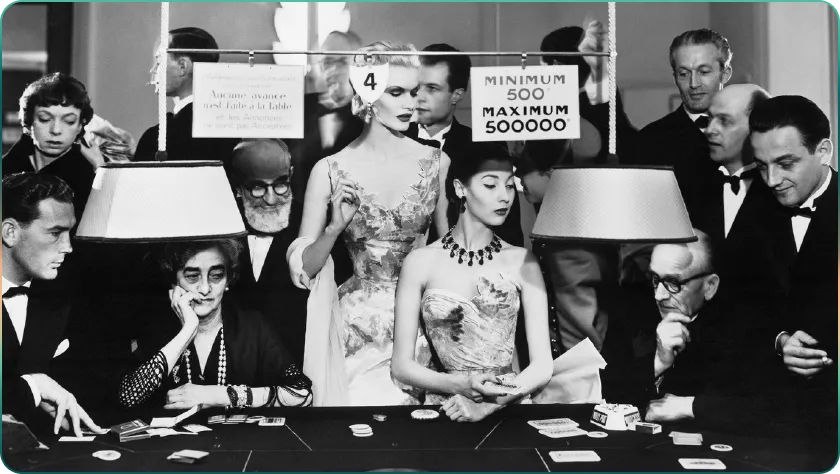The Evolution of Gambling Across Generations – Baby Boomers to Gen Z

Over the last 50 years, we have seen a considerable change in the way people gamble and even the way that people think about gambling. Without a doubt, the industry has evolved in such a way over the last few decades that to some, the landscape may look completely unrecognizable now.
What is interesting is how the industry has reacted to the different generational trends over the years, having really tapped into the multiple psyches of gamblers based on their demographics and especially their age.
Key components, including what each generation is following and like, have helped the gambling industry tap into new markets and even help to attract ever younger gamblers as advancements in technology have become increasingly more sophisticated.
Baby Boomers and the Golden Age of Gambling
For Baby Boomers, gambling was once a symbol of glamour, indulgence, and high society. The post-war economic boom of the mid-20th century gave rise to a generation that viewed gambling not as a vice but as a luxury pastime. The influence of pop culture played a significant role in shaping this perception. Films like Ocean's Eleven (1960), The Cincinnati Kid (1965), and James Bond classics such as Diamonds Are Forever presented casinos as exotic, elegant venues filled with suave characters, high stakes, and champagne-soaked excitement.
As a result, Baby Boomers associated gambling with sophistication and status. Trips to Las Vegas or Monte Carlo were milestones or dream holidays rather than frequent activities. Gambling was largely confined to physical locations like racetracks, bingo halls, and land-based casinos. The social aspect of these environments was substantial, and Boomers often participated in gambling activities as part of broader social or entertainment occasions.
Slot machines and card games like blackjack and poker were staples, with a slow-paced and tactile charm. Importantly, gambling was framed as a recreational activity done in moderation – something that could be classy rather than compulsive. The presence of regulated operators and visible cues to responsible gambling helped reinforce this perception.

Were Generation X Caught Between Tradition and Transformation?
Generation X, born roughly between the mid-1960s and early 1980s, straddled a curious gap between the traditional gambling of their parents and the digital revolution in gambling that would define later generations. Their formative years were still shaped by the cinematic allure of gambling, with films like Casino (1995) and Rounders (1998) portraying the highs and lows of the gambling world with gritty realism and style.
However, this generation also witnessed the initial shift towards online gambling. The emergence of the internet in the 1990s brought about the first wave of digital casinos and poker rooms. As such, gambling became more accessible but less romanticized. While Gen Xers still valued the social and experiential side of gambling, they were also the first to engage meaningfully with online platforms, especially during the early 2000s poker boom.
Lotteries, sports betting, and poker tournaments became highly popular among this group, with a significant number participating in workplace pools, fantasy leagues, and televised poker events. The influence of televised competitions like the World Series of Poker gave gambling a competitive and skill-based sheen, which appealed to Gen X's more pragmatic outlook.
This generation remained largely skeptical of newer, riskier mechanics – many expressed concern over the shift towards algorithm-based games and the blurring of lines between skill and chance. Their experience paved the way for legal and regulatory discussions that would take on greater urgency in the decades to come.
Millennials: The Tech-Savvy Gambling Game Changers
Millennials gamblers, those born between the early 1980s and mid-1990s, grew up in an era defined by rapid technological change, economic instability, and cultural shifts. These forces substantially shaped their attitudes toward gambling, making them more cautious but also more open to digital and unconventional formats.
Unlike previous generations, Millennials were not exposed to the same romanticized depictions of gambling in pop culture, though it was still there. While gambling occasionally appeared in films or television, it was often portrayed with more complexity, ambiguity, or even negativity, as seen in Uncut Gems or 21. This shift in tone, combined with the aftermath of the 2008 financial crisis, instilled a more critical view of risk and chance among Millennials. For many Millennials as well, some of them may have grown up around playing cards and been exposed to these ‘tools’ from an early age with their parents, or indeed, may have been aware of their parents having ‘a casual game of poker’, which later on defined their interest in blackjack online casinos for example.
It is fair to say that, at the same time, Millennials were early adopters of mobile and online gaming, with this niche really taking off around the late 2000s. As such, they engaged with digital games that incorporated gambling-like mechanics, such as loot boxes, daily spins, and virtual currencies. While these features initially flew under the regulatory radar, they significantly blurred the lines between gaming and gambling. As a result, Millennials became the first generation to experience gambling mechanics within non-casino environments - from FIFA Ultimate Team packs to Clash Royale chests.
This exposure has, it needs to be said, created a paradox. On one hand, it seemed as though Millennials were drawn to games of chance and reward systems, though on the other, many have become vocal critics of exploitative practices.
As such, it appears that Millennials have been key in pushing for greater transparency, fairness, and ethical standards in digital gambling and gaming spaces, especially when it comes to advocating things like responsible gambling measures, such as app-based spending controls, and other gamified experiences that reward strategy over luck.
Generation Z and Their Exposure to the Digital Age
Gen Z, born from the late 1990s onwards, has essentially grown up in a fully digital world, just as Google was basically born. Their relationship with gambling is shaped not by casinos or even online poker, but by mobile games, influencer culture, and streaming platforms. They’ve had almost no mainstream cinematic exposure to glamorous gambling and thus lack the romanticized narrative experienced by earlier generations.
Instead, they are more familiar with microtransactions, gamified mobile experiences, and platforms like Twitch or YouTube where gaming and gambling sometimes intersect.
Loot boxes, skins, gacha mechanics, and casino-style mobile games have been deeply embedded in Gen Z’s entertainment habits. As a result, many members of this generation were exposed to gambling-like elements from an early age, often without understanding the risks or odds involved. The normalization of these features has raised substantial concerns, particularly as regulators have begun to scrutinize how these mechanics affect underage users.
However, it needs to be said that Gen Z is not unaware of the potential dangers. As a result, they are significantly more educated and vocal about online ethics, mental health, and exploitative design. Influencers and streamers who promote gambling are often met with backlash from Gen Z audiences, who demand transparency and accountability. This generation values authenticity and social responsibility, and is more likely to support platforms that promote safe play and ethical monetization.
Moreover, Gen Z’s preferred platforms – such as TikTok, Discord, and Instagram – have enabled them to form tight-knit communities around niche interests, including gambling. These communities often serve as peer-led forums for sharing advice, strategies, or even warnings. As such, Gen Z approaches gambling with a blend of caution, curiosity, and social awareness that substantially differs from the carefree indulgence of older generations.

How Loot Boxes Changed Gambling Perceptions
Now it seems that loot boxes represent a pivotal moment in how gambling is perceived by modern generations. Initially introduced as a way to enhance gameplay, loot boxes quickly evolved into a billion-dollar business model that mimicked the unpredictability and reward systems of traditional gambling.
For Millennials and Gen Z, loot boxes have become the most visible example of how gambling mechanics can be embedded within mainstream entertainment. These digital containers offer randomized rewards in exchange for real or in-game currency, creating the same thrill of chance that casinos offer. As a result, they’ve triggered widespread concern among parents, educators, and lawmakers alike.
Significantly, countries like Belgium and the Netherlands have already classified certain types of loot boxes as gambling, leading to bans or regulatory restrictions. The debate around loot boxes has also influenced public opinion, prompting younger generations to question the ethics of monetized randomness in games. Unlike traditional gamblers, Gen Z and Millennials are more likely to discuss odds, return-on-investment, and fairness language once reserved for seasoned bettors.
This shift has contributed to the rise of alternative gaming models such as "cosmetic-only" purchases and battle passes, which offer predictable, non-random rewards. Developers who adapt to these preferences are more likely to earn trust and loyalty from modern players. As such, the loot box controversy has not only sparked regulatory changes but also fundamentally altered how younger generations evaluate risk, fairness, and value in entertainment.
The Lasting Influence of Pop Culture on Gambling
One of the most substantial shifts across generations is the declining influence of pop culture in shaping gambling narratives. For Boomers and Gen X, films and television were primary vehicles for normalizing and even glorifying gambling. Characters who won big, faced ruin, or walked the tightrope of high-stakes games were romanticized, creating iconic cultural moments that shaped public perception.
By contrast, Millennials and Gen Z have grown up with more fragmented and niche media consumption. Gambling is no longer a central plot device in blockbuster films or primetime shows. When it does appear, it is often through cautionary tales or in niche formats like streaming documentaries. As a result, younger audiences are less likely to associate gambling with style or success and more likely to view it as a serious decision with real consequences.
The rise of influencers has partially replaced traditional media in shaping gambling attitudes. Streamers showcasing casino games, sports betting, or loot box openings wield substantial influence, but are also subject to significant scrutiny. Gen Z in particular is quick to call out misleading or unethical content, often demanding transparency about sponsorships, odds, and risks.
As such, the cultural framing of gambling has undergone a substantial shift – from cinematic glamour to digital accountability. Pop culture is no longer the dominant force guiding perceptions; instead, online communities, influencers, and peer networks have taken its place, creating a more democratized and critical approach to gambling discourse.
How Generations Will Shape Gambling’s Future?
Looking ahead, the divide between generations will likely continue to shape the gambling industry in significant ways. Baby Boomers and Gen X remain more comfortable with traditional formats, including in-person betting, lotteries, and classic casino games. As these cohorts age, operators will need to adapt their offerings to maintain engagement, perhaps through hybrid experiences that blend digital convenience with tactile tradition.
Millennials and Gen Z, on the other hand, are driving demand for gamified, ethical, and mobile-first experiences. As such, future innovations in gambling will likely prioritize transparency, social integration, and personalization. Features like social betting pools, skill-based mini-games, and blockchain-powered fairness verification could become the new norm.
Gambling regulation will definitely have a key influence. Younger generations are more politically active and vocal about digital rights and consumer protections. Their pressure is likely to result in more robust frameworks around digital gambling, loot boxes, and influencer transparency.
As a result, the future of gambling will not be defined solely by technological capability, but by the values and expectations of its users. Understanding these generational shifts is not just useful – it is essential for any operator, developer, or policymaker hoping to thrive in an increasingly diverse and discerning market.





Review this Blog
Leave a Comment
User Comments
comments for The Evolution of Gambling Across Generations – Baby Boomers to Gen Z